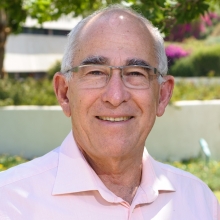Fast friends
Eden and Steven Romick, and Prof. Ido Amit
People behind the science

“Scientists have created a ‘critical mass’ of knowledge around the immune system and what it means for personalizing medical treatment for a variety of diseases,” says Steven. “Ido has led the way in this area, and supporting him at this inflection point in his career will, I believe, help him to leverage the work that he’s done until now to make some incredibly important breakthroughs that will have a major impact on health care.”
Several years ago, the Romicks established the Carol and Moise Emquies and Family & Eden and Steven Romick and Family Compound Management Laboratory at the Nancy and Stephen Grand Israel National Center for Personalized Medicine. Steven is an International Board member of the Institute, and he’s also a Board member at Cedars Sinai Medical Center in Los Angeles, among other philanthropic and volunteer engagements. Eden sits on the Board of Trustees of Brentwood School in Los Angeles. The Romicks’ latest gift establishes the Eden and Steven Romick Professorial Chair in perpetuity.
Eden’s and Steven’s intrigue with Prof. Amit’s work began when they decided to fund two postdoctoral fellowships in his lab, in a collaboration with the couple’s alma mater, Northwestern University. Prof. Amit’s research hit a chord with them, with its focus on the function of the immune system and its relation to cancer, neurodegenerative diseases, autoimmune disorders, and metabolism, using single-cell genomic sequencing technologies. Only recently has it become clear how deeply the immune system is involved in a broad variety of phenomena in the human body, and the Amit lab has been at the forefront of this field. In cancer treatment in particular, immunotherapies—drugs that target and manipulate the immune system so that it can better fend off cancer—represent a major, promising area of scientific and medical progress.
“In coming to know Ido and becoming familiar with his work, I understood that Ido is the mechanic who is figuring out the immune system, and that through that, his research will have a diffuse and diverse effect on health,” says Steven. “His breadth is incredible. And it so happens that we share a love for biking—and he’s an incredible person too.”
Speeding to success
The two men have already done two major bike rides together—one near the Dead Sea, and another up Israel’s Mediterranean coastline. On their rides, Steven gets a report on Ido’s work, and they talk about fatherhood, music, and the vistas they relish as they speed past.
Most of all, on their common horizon is the anticipation of major advances in human health through basic research. In a recent study, Prof. Amit and his departmental colleague Prof. Eran Elinav identified and characterized a mechanism in the immune system that, at a time of excess weight gain, penetrates fat tissues and activates a protein called Trem2, which operates as a signaling receptor, as well as certain metabolic pathways which help protect the fat cells’ harmful byproducts. It’s a discovery that is poised to have major impact on treating metabolic diseases but also appears to have important roles in Alzheimer’s disease.
The research relies on a unique technology Prof. Amit was among the first in the world to develop, called single-cell sequencing, which homes in on individual cells and sequences all the genes they use for their activity. The technology, together with artificial intelligence techniques, enables scientists to peer into the most complex tissues and pinpoint each and every cell type, the pathways they operate, and their function. Much of this mapping was not on the scientific community’s radar until now and Prof. Amit is one of its greatest champions.
If the concept of identifying a tipping point is one that appeals to Steven, he has found a like-minded friend in Prof. Amit, who sees the immune system as playing a role in jumping in to save—and heal—the body at key moments.
Steven and Eden Romick, who have four children, say they are thinking about the health of their offspring and of future generations when they give to scientific and medical research. “As parents, as an investor, and in our giving, we don’t need to be everywhere all the time,” says Steven. “But we do need to be there at the right moments, if we’re going to make a real difference. Ultimately, though, it’s the science that will make all the difference.”
Prof. Amit is also supported by Adelis Foundation, BLG Trust, Estate of Ruth Drobnes, Drs. Herbert and Esther Hecht, Carla Hunter and Andre M. Schub, The Kekst Family Institute for Medical Genetics, Helen and Martin Kimmel Award for Innovative Investigation, Estate of Arthur Rath, Rising Tide Foundation, The Bill & Patricia Ritchie Foundation Limited, Anita James Rosen Foundation, Steven B. Rubenstein Research Fund for Leukemia and Other Blood Disorders,Sagol Institute for Longevity Research, Estate of Simon Saretzky, Thompson Family Foundation Alzheimer's Research Fund, The Wolfson Family Charitable Trust, European Research Council, Prof. Amit is also the incumbent of the Eden and Steven Romick Professorial Chair.








